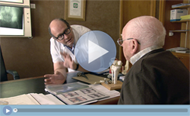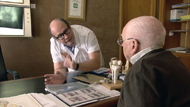More information about Knee Replacement Surgery
When is Knee Replacement Surgery considered?
When the surface of the Knee joint is worn away, at a certain point in time walking and activities of daily living become very difficult. Standardized treatment such as weight loss, anti-inflammatory medication, braces, orthotics, steroid injections, physical therapy, etc. are all tried and if effective that is fine. In many cases, however, despite the above non-surgical treatments, functional limitations persist.Who is most suited to having Knee Replacement surgery?
Most people who are considering knee replacement are limited to walking less than three to six blocks, or less than 15 to 20 minutes. They have difficult time getting up out of a chair. They have rest pain. They are taking anti-inflammatory medication and/or pain medicine on a regular basis and the pain is generally progressive.How long is the new Knee expected to last?
Knee replacement surgery has performed since the early 1970's and our most recent designs appear to have 85% to 90% survival at twenty years. Knee replacement surgery in 1998 was more successful than hip replacement surgery with a lower incidence of revision.How long can I expect to be in hospital following the Knee Replacement Surgery?
The actual procedure involving knee replacement involves either general or epidural anesthesia with a four to six day hospitalisation. The surgery itself takes between 1-1/2 and 2-1/2 hours. In most cases patients donate two units of autologous blood to be used in the postoperative period. Weight-bearing begins immediately the first postoperative day. Patients usually use a walker for a period of one to two weeks, going to crutches and then a cane. People are off all walking aids anywhere from three weeks to two months.What are the success rates of Knee Replacement Surgery?
Success rates in knee replacements are approximately 90% with 10% not doing as well. This can be due to either stiffness or ache or swelling in and about the knee. The most significant complications, aside from general medical complications (heart and lung) involve infection of the prosthesis. If this occurs, in some cases the prosthesis can be saved and the patient taken back to the operating room, the knee irrigated with antibiotic irrigation and then be on antibiotics. In some cases if this does not respond, then the entire prosthesis must be taken out and antibodies given for six weeks and then another attempt at re-implantation of the of the prosthesis must occur. In an extremely small percentage of cases, conceivably if the infection could not be controlled, then one is left a knee fusion in which the femur and tibia are fused in one bone.Following Knee Replacement Surgery, is there any activities I should avoid?
You will be advised on how to look after your new knee properly and taking care to avoid straining it, by a specially trained physiotherapist. There may be some activities, such as running or high impact aerobics, that you will be advised to avoid. Activities after knee replacement that should produce no difficulty are simple walking, bicycling, golfing, swimming. The prosthesis is not designed for impact loading sports such as skiing, basketball, racquetball. People have been know to play doubles tennis with bilateral knee replacements.
Click the video above to see how Operation France helped arrange a hip replacement for Dennis Comey

Clinique Sainte Isabelle, situated in Abbeville, France - only an hour travelling into France

Clinique Sainte Isabelle has two hotels on the hospital grounds - a popular choice for patients, and their families & friends to stay close

The world renowned surgeon Dr Renaux specialises in Orthapedic Surgery and experienced in providing treatment for British patients
